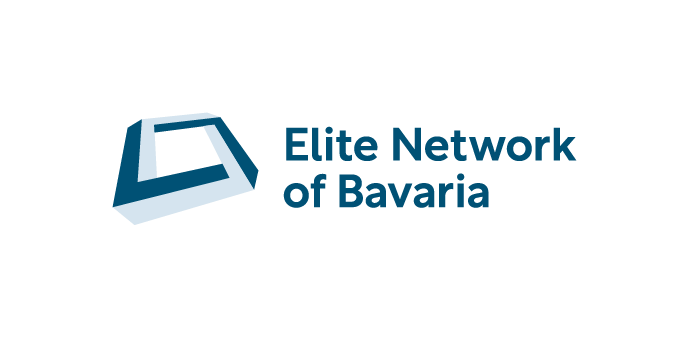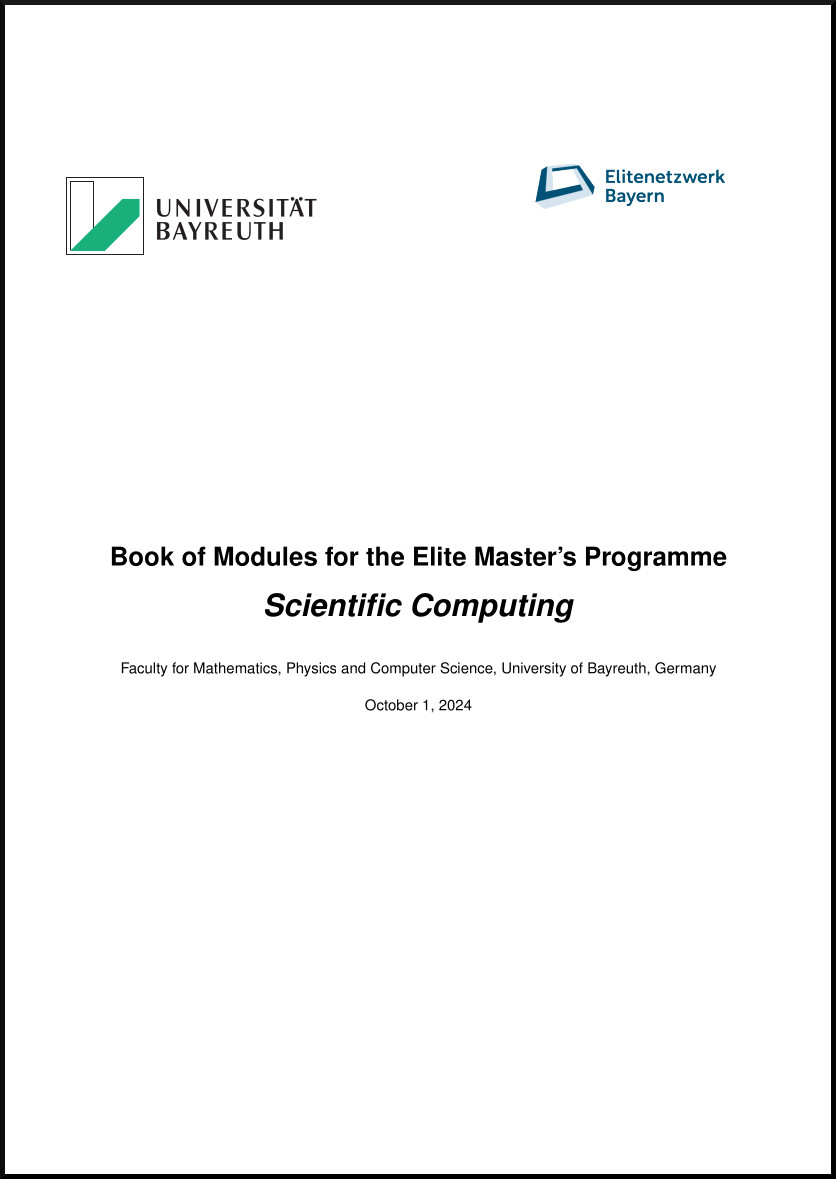Module Overview
The elite master's course Scientific Computing offers a broad range of modules. They are grouped into the following six module areas.
- A. Mathematical FoundationHide
-
Module A1: "Numerical Methods for Partial Differential Equations" (6 ECTS)
Module A2: "Applied Functional Analysis" (8 ECTS)
The modules A1 and A2 are the foundation of the master's programme.
- B. Modeling and SimulationHide
-
Elective Module B1: "Advanced Topics in Numerical Mathematics" (0 - 16 ECTS)
Currently, modules can be chosen from
- Module B1.1: "Numerical Methods for General Types of PDEs"
- Module B1.2: "Discontinuous and Multiscale Methods for PDEs"
- Module B1.3: "Constructive Approximation Methods"
- Module B1.4: "Mathematical Control Theory"
- Module B1.5: "Nonlinear Optimization"
- Module B1.6: "Optimization of Partial Differential Equations"
Elective Module B2: "Modeling and Simulation" (8 - 16 ECTS)
Currently, modules can be chosen from
- Module B2.1: "Partial Differential Equations and Integral Equations"
- Module B2.2: "Modeling with Differential Equations"
- Module B2.3: "Mathematical Modeling for Climate and Environment"
- Module B2.4: "Ergodic Theory and Data Science"
- Module B2.5: "Pattern Recognition"
- Module B2.6: "Mechanics of Continua"
- Module B2.7: "Molecular Dynamics Simulations of Biophysical Systems"
- Module B2.8: "Bioinformatics: Molecular Modeling"
- Module B2.9: "Foundations of Bioinformatics"
- Module B2.10: "Quantum Chemistry: Methods and Algorithms"
- Module B2.11: "Advanced Strengths of Materials"
- Module B2.12: "Computer Aided Engineering"
- Module B2.13: "Advanced Programming for Engineers"
- Module B2.14: "Model Building and Simulation of Electrochemical Storage"
- Module B2.15: "Foundations of Data Management"
At least 8 ECTS must not stem from the mathematical curriculum.
Module B3: "Complexity Reduction" (16 - 24 ECTS)
Currently, modules can be chosen from
- Module B3.1: "Efficient Treatment of Non-local Operators"
- Module B3.2: "Fast Methods for Differential and Integral Equations"
- Module B3.3: "Numerical Methods for Uncertainty Quantification"
- Module B3.4: "High-dimensional Approximation"
- Module B3.5: "Data Analytics"
- Module B3.6: "Complexity Reduction in Control"
- Module B3.7: "Meshfree Methods"
- Module B3.8: "Boundary Element Methods"
- Module B3.9: "Optimization Methods".
- C. High-Performance ComputingHide
-
Elective Module C1: "High-Performance Computing" (12 ECTS)
Currently, modules can be chosen from
- Module C1.1: "Algorithms and Data Structures II"
- Module C1.2: "Algorithms and Data Structures III"
- Module C1.3: "Parallel and Distributed Systems I"
- Module C1.4: "Parallel and Distributed Systems II"
- Module C1.5: "High-Performance Computing"
- Module C1.6: "Parallel Algorithms"
- Module C1.7: "Programming and Data Analysis in Python"
Module C2: Practical course "Parallel Numerical Methods" (2 ECTS)
- D. Specialisation and TrainingHide
-
Module D1: "Special Skills in Scientific Computing" (4 ECTS)
A specialisation module from the research areas listed in B1 or B3.
Module D2: "Industrial Internship" (8 ECTS)
Either a 6 weeks industrial internship or another module from B3.
Module B4: "Modeling and Status Seminar" (8 ECTS)
Each year, a status seminar (winter term) and a one week modeling seminar (summer term) will be held.
- In the status seminar students report their study status and the results of their own research.
- In the modeling seminar students apply their abilities to complex real world problems.
- E. Soft SkillsHide
-
Participation in seminars of in total 60 hours which improve key qualifications such as presentation techniques, scientific writing, teamwork, literature research and personality development. (2 ECTS)
- F. Master's Thesis Hide
-
We encourage students to prepare their master's thesis in coorporation with industry or international experts. Students receive compensation for travel expenses during research stays. (30 ECTS)
In order to be a able to make a choice that is consistent with the examination regulations (German version, English version), we point out some constraints and dependencies among the modules.
- All students have to attend the Practical Course on Parallel Numerical Methods (C2) for which B3.1 and C1.3 are recommended. This course is offered each year in the winter break. We also recommend to participate in this course at the end of the first semester.
- Notice that all students have to attend two courses of the applied modules B2.5-B2.14 (Module B2.6 is an exception, as it is already worth 8 ECTS.). At most 8 ECTS from the mathematical modules B2.1-B2.4 are taken account of.
- Students have to participate in two modeling weeks and two status seminars (D3). Modeling weeks are conducted in the summer breaks, status seminars are carried out in the winter breaks.
More detailed information about the modules and the offered courses can be found in the Book of Modules and for special modules on the following webpages:
- Module D3: Modelling Seminar
- Module D3: Status Seminar
- Module C2: Practical Course on Parallel Numerical Methods
Recommended curricula for summer/winter start or even part-time study can be found in the Book of Modules.



